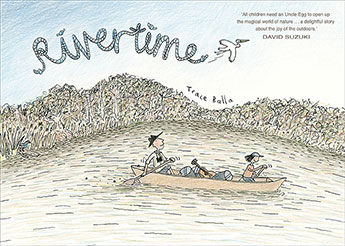This book is based on a 10-day canoe trip up the Glenelg River taken by Trace Balla in 2012 with her partner. The narrator of this book is Clancy, 10.5 years old. His Uncle Egg has been waiting for him to be old enough to take on a camping trip up the Glenelg River, and now that day is here. Clancy doesn’t want to go – he is a city kid and likes numbers, paper aeroplanes, TV and computers. He isn’t interested in canoes or birds or camping. However, Uncle Egg and Clancy’s mum get their way, and Clancy and Uncle Egg head for the river.
The first night of camping the ground is too hard, there are millions of mosquitoes, and Clancy is missing all his toys and games. The next morning, Uncle Egg powers on in the face of Clancy’s poor spirits, and they start heading upstream in the canoe. Gradually over the course of their trip, Clancy begins to enjoy himself. He particularly enjoys one campsite where there are other kids to play with. Their dad Uncle Eddie explains that their people, the Gunditjmara, have been living in the area for about 50,000 years. Their mum Aunty Betty shows Clancy how to make string using kangaroo grass. Clancy and Uncle Egg push on, and eventually get to a point where the river starts to narrow, and this is where they turn around to head back downstream.
By the end of the trip, the peaceful surroundings, the natural beauty of the river, its plants and animals have worked their calming magic and Clancy is enjoying everything. He is open and interested and engaged with the natural world around him. ‘Rivertime’ has come into effect and Clancy is no longer counting minutes and hours and days, and there is no schedule to be adhered to.
This book is done in comic book style, with panels and speech bubbles. It resembles the style of a graphic novel. The illustrations are done in ink and pencil, and as to be expected, the palette is dominated by the greens and browns of the bush and the river. Many of the panels also contain labelled drawings of birds and animals and plants, and the birds often have their calls written down as well so the reader can imagine how they sound – and will perhaps be able to identify them when they are on their own camping trip. The endpapers are lovely, and feature all these plants and animals, neatly labelled. The birds are on the front papers and the other animals and plants at the end of the book.
This book is part of the Premier's Reading Challenge for years 5 to 6, and was the winner of the Readings Children’s Book Prize and the Wilderness Society's Environment Award for Children's Literature in 2015. It was shortlisted for the CBCA’s Picture Book of the Year Award and the Crichton Award in 2015, the NSW Premier's Literary Awards, and the Speech Pathology Book of the Year Awards.
Trace Balla is not Indigenous, but acknowledges at the start of the book that parts of the Glenelg River are known as Bochara and are shared by the Gunditjmara and Boandik peoples.
Series title: Followed by similar books, ‘Rockhopping’ and ‘Landing with Wings’

